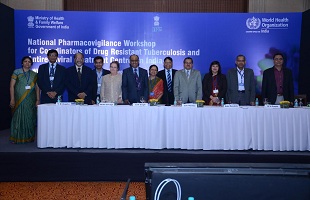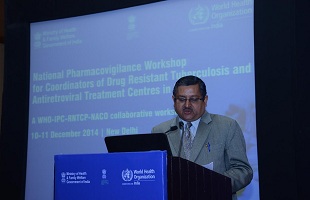
World Health Organization Country Office for India in collaboration with Pharmacovigilance Programme of India (PvPI), Revised National Tuberculosis Control Programme and the National AIDS Control Organisation, organized a National Pharmacovigilance Workshop on Adverse Drug Reaction (ADR) monitoring, reporting and causality assessment for Coordinators of Drug Resistant Tuberculosis and ART Centres from 10-11 December 2014 at New Delhi.
Inaugurating the conference, Mr Lov Verma, Secretary, Ministry of Health & Family Welfare, Government of India said, “The workshop is historic in terms of introducing pharmacovigilance in two of the most significant public health programmes, TB and HIV in the country.” He also mentioned that organizing this workshop is a commendable step in the domain of pharmacovigilance, which will set the stage for creating a nation-wide system for patient safety reporting in India.

Speaking at the workshop, Dr Nata Menabde, WHO Representative to India said, “The UN Sustainable Development Goals clearly acknowledge the need for access to safe, effective, quality, and affordable essential medicines and vaccines for all. This pioneering initiative to introduce pharmacovigilance in public health programmes in the country by bringing HIV-AIDS and TB in the ambit of Pharmacovigilance Programme of India would act as one of the key measures for access to safe medicines in the country. It is time that access to safe medicines moves from being a political issue to being a public health precondition, thus laying down the foundation of attaining Universal Health Coverage in India”.
The workshop was organized for Medical and Statistical Officers from identified Drug Resistant -TB centres and coordinators of ART centre from all over India. The workshop facilitated a fruitful exchange of best practices and experiences with regard to pharmacovigilance, causality assessment and reporting of adverse drug reactions in India. It also discussed operational challenges and bottlenecks of Pharmacovigilance along with giving hands on training sessions on causality assessment and functioning of WHO Vigiflow software.
Speaking on the occasion, Dr RS Gupta, Deputy Director General TB highlighted the significance of introducing pharmacovigilance in the TB programme with regard to the larger agenda of avoidable morbidity and treatment failure while administering TB treatments. He also appreciated the leadership of WHO and Indian Pharmacopoeia Commission (IPC) for organizing this significant workshop. Dr K.S. Sachdeva, Additional Deputy Director General, TB, emphasized the need for TB practitioners to adopt a systematic approach for surveillance of ADR and other drug related problems towards strengthening pharmacovigilance of the anti-TB medicines in the country.
Dr G. N. Singh, Secretary-Cum Scientific Director IPC, Ghaziabad highlighted the mission of promoting patient safety in the country by ensuring that the benefits associated with the use of medicine outweighs the associated risks. He also stressed the need for actively engaging healthcare professionals in building synergies for monitoring adverse drugs reactions in public health programmes of the country.
The workshop saw wide representation of coordinators of TB and ART centres all across India. It provided a platform for the technical associates and coordinators of PvPI for cross-fertilization with the coordinators of TB and HIV to contribute to the pharmacovigilance agenda in close cooperation. National and international experts shared best practices and their experiences on ADR monitoring, reporting and causality assessment at the two-day pioneering workshop on introducing pharmacovigilance in public health programmes.
